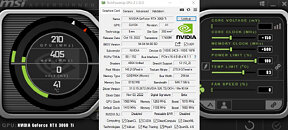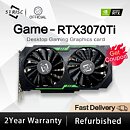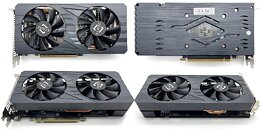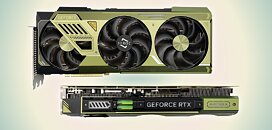T0@st
News Editor
- Joined
- Mar 7, 2023
- Messages
- 2,229 (3.24/day)
- Location
- South East, UK
NVIDIA is stepping up to manufacturers of counterfeit graphics card in China according to an article published by MyDrivers - the hardware giant is partnering up with a number of the nation's major e-commerce companies in order to eliminate inventories of bogus GPUs. It is claimed that these online retail platforms, including JD.com and Douyin, are partway into removing a swathe of dodgy stock from their listings. NVIDIA is seeking to disassociate itself from the pool of unlicensed hardware and the brands responsible for flooding the domestic and foreign markets with so-called fake graphics cards. The company is reputed to be puzzled about the murky origins of this bootlegging of their patented designs.
The market became saturated with fake hardware during the Ethereum mining boom - little known cottage companies such as 51RSIC, Corn, Bingying and JieShuoMllse were pushing rebadged cheap OEM cards to domestic e-tail sites. The knock-off GPUs also crept outside of that sector, and import listings started to appear on international platforms including Ebay, AliExpress, Amazon and Newegg. NVIDIA is also fighting to stop the sale of refurbished cards - these are very likely to have been utilized in intensive cryptocurrency mining activities. A flood of these hit the market following an extreme downturn in crypto mining efforts, and many enthusiast communities have warned against acquiring pre-owned cards due to the high risk of component failure.




Laptop versions of GeForce RTX cards are being adapted into desktop purpose form. For example 51RSIC has produced a card called the GeForce RTX 3070 TiM 8 GB, which appears to be a fictitious model name and its specifications point to it being based on a mobile variation. NVIDIA has requested, via its new partnerships, that graphics cards based on older GPU architectures - in particular the Turing and Pascal generations - ought to be removed from e-commerce sites. The latest GeForce RTX 40-series has not been spared from getting the clone treatment. 51RSIC offers a spirit-level equipped RTX 4090 card - this is purported to be a rebadged version of MANLI's custom cooled GeForce RTX 4090 Gallardo design.




NVIDIA has outlined a simple guide to a potential customer, in order to avoid the purchase of an ersatz graphics card. It first recommends that the buyer only consider the latest GeForce RTX 40-series, due to Ada Lovelace architecture debuting after the collapse of cryptocurrency, therefore GPUs from that range are not heavily associated with mining activities. The second suggestion is to only source a card from an official partner - prime examples for the Chinese market are ASUS, Colorful, Gainson, GALAX, Gigabyte, Injoy, MSI, Zotac, Renaissance, ASL, Maxsun, and Yeston - the customer will also gain a proper guarantee via these companies. The third and last bit of advice is aimed at a customer who does not have the budget to reach for the RTX 40-range - NVIDIA recommends only purchasing newer SKUs based on its Ampere architecture, with good candidates in the GeForce RTX 3060 8 GB and GeForce RTX 3060 Ti GDDR6X models.
It is encouraging to see NVIDIA's new focus on eliminating unlicensed products from online retailers, but the endeavor has only targeted one regional market. The Chinese hardware sector is massive and hard to regulate, but the distribution of counterfeit and poorly refurbished cards has spread internationally. This is not a brand new problem, but Team Green will need to address it in order to fully satisfy its customer base.
View at TechPowerUp Main Site | Source
The market became saturated with fake hardware during the Ethereum mining boom - little known cottage companies such as 51RSIC, Corn, Bingying and JieShuoMllse were pushing rebadged cheap OEM cards to domestic e-tail sites. The knock-off GPUs also crept outside of that sector, and import listings started to appear on international platforms including Ebay, AliExpress, Amazon and Newegg. NVIDIA is also fighting to stop the sale of refurbished cards - these are very likely to have been utilized in intensive cryptocurrency mining activities. A flood of these hit the market following an extreme downturn in crypto mining efforts, and many enthusiast communities have warned against acquiring pre-owned cards due to the high risk of component failure.




Laptop versions of GeForce RTX cards are being adapted into desktop purpose form. For example 51RSIC has produced a card called the GeForce RTX 3070 TiM 8 GB, which appears to be a fictitious model name and its specifications point to it being based on a mobile variation. NVIDIA has requested, via its new partnerships, that graphics cards based on older GPU architectures - in particular the Turing and Pascal generations - ought to be removed from e-commerce sites. The latest GeForce RTX 40-series has not been spared from getting the clone treatment. 51RSIC offers a spirit-level equipped RTX 4090 card - this is purported to be a rebadged version of MANLI's custom cooled GeForce RTX 4090 Gallardo design.




NVIDIA has outlined a simple guide to a potential customer, in order to avoid the purchase of an ersatz graphics card. It first recommends that the buyer only consider the latest GeForce RTX 40-series, due to Ada Lovelace architecture debuting after the collapse of cryptocurrency, therefore GPUs from that range are not heavily associated with mining activities. The second suggestion is to only source a card from an official partner - prime examples for the Chinese market are ASUS, Colorful, Gainson, GALAX, Gigabyte, Injoy, MSI, Zotac, Renaissance, ASL, Maxsun, and Yeston - the customer will also gain a proper guarantee via these companies. The third and last bit of advice is aimed at a customer who does not have the budget to reach for the RTX 40-range - NVIDIA recommends only purchasing newer SKUs based on its Ampere architecture, with good candidates in the GeForce RTX 3060 8 GB and GeForce RTX 3060 Ti GDDR6X models.
It is encouraging to see NVIDIA's new focus on eliminating unlicensed products from online retailers, but the endeavor has only targeted one regional market. The Chinese hardware sector is massive and hard to regulate, but the distribution of counterfeit and poorly refurbished cards has spread internationally. This is not a brand new problem, but Team Green will need to address it in order to fully satisfy its customer base.
View at TechPowerUp Main Site | Source


 .
. .
.


